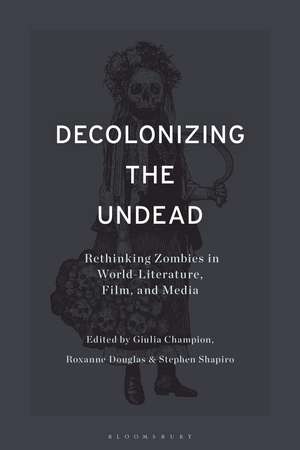Decolonizing the Undead: Rethinking Zombies in World-Literature, Film, and Media
Editat de Professor Stephen Shapiro, Dr Giulia Champion, Dr Roxanne Douglasen Limba Engleză Paperback – 17 apr 2024
| Toate formatele și edițiile | Preț | Express |
|---|---|---|
| Paperback (1) | 191.22 lei 6-8 săpt. | |
| Bloomsbury Publishing – 17 apr 2024 | 191.22 lei 6-8 săpt. | |
| Hardback (1) | 539.57 lei 6-8 săpt. | |
| Bloomsbury Publishing – 21 sep 2022 | 539.57 lei 6-8 săpt. |
Preț: 191.22 lei
Preț vechi: 249.30 lei
-23% Nou
Puncte Express: 287
Preț estimativ în valută:
36.59€ • 38.06$ • 30.21£
36.59€ • 38.06$ • 30.21£
Carte tipărită la comandă
Livrare economică 14-28 aprilie
Preluare comenzi: 021 569.72.76
Specificații
ISBN-13: 9781350271166
ISBN-10: 1350271160
Pagini: 232
Dimensiuni: 156 x 234 x 25 mm
Greutate: 0.33 kg
Editura: Bloomsbury Publishing
Colecția Bloomsbury Academic
Locul publicării:London, United Kingdom
ISBN-10: 1350271160
Pagini: 232
Dimensiuni: 156 x 234 x 25 mm
Greutate: 0.33 kg
Editura: Bloomsbury Publishing
Colecția Bloomsbury Academic
Locul publicării:London, United Kingdom
Caracteristici
Offers a fresh, diverse and global perspective on the zombie in works from the Caribbean, sub-Saharan Africa, Japan, India, Ireland and Iraq
Notă biografică
Stephen Shapiro is Professor of American Literature at the University of Warwick, UK. He is the author or editor of 17 books, including How to Read Marx's Capital (2008) and The Wire: Race, Class, and Genre (2012).Giulia Champion is Lecturer in the Interdisciplinary Studies Centre at the University of Essex and Research Assistant in the Centre for Interdisciplinary Methodologies at the University of Warwick, UK. She is the co-editor of Ethical Futures and Global Science Fiction (2020) and "Intersections of Activism and Academia" with the Bulletin of Latin American Research (2022).Roxanne Douglas is Teaching Fellow in the Department of English & Comparative Literary Studies at the University of Warwick, UK.
Cuprins
Acknowledgements List of Contributors Roxanne Douglas and Giulia Champion - "Introduction: Decolonizing the Zombie" Part I Thinking Zombies 1. 'Il y a des zombies dans ceci...': Dessalines, Disembodiment, and Early Haitian Literature, Elizabeth Kelly (Florida Polytechnic University, USA) 2. White and Black Zombies: How Race Rewrites the Zombie Narrative, Cécile?Accilien (Kennesaw State University, USA) 3. Decolonizing the Zombie: I Walked with a Zombie's Critique of Centrist Liberalism, Stephen Shapiro (University of Warwick, UK) Part II Zombie World-System 4. Samurai Zombies: Japan's Undead Past, Frank Jacob (Nord Universitet, Norway) 5. Crude Monsters in the 'Extractive Zone:' The Creaturely and Ecological Zombie, Josephine Taylor (Royal Holloway, University of London, UK) 6. Undead, Undeader, Undeadest: Narrating the Unevenness of Ecological Crisis in Nana Nkweti"s 'It Just Kills You Inside', Fiona Farnsworth (University of Warwick, UK) 7. Zombie Proletkino: Labor, Race and Genre in Pedro Costa's Casa de Lava, Thomas Waller (University of Nottingham, UK) 8. 'It Feels Like I'm Giving My Body Something It Needs in an Intense and Powerful Way:' Netflix, Santa Clarita Diet and the Neoliberal Feminist Encounter with Pleasure Politics, Roxanne Douglas (University of Warwick, UK) Part III Zombie Decolonial 9. De/Zombification as Decolonial Critique: Beyond Man, Nature and the Posthuman in Folklore and Fiction from South Africa, Rebecca Duncan (Linnaeus University, Sweden) 10. Zombies, Placelessness and Transcultural Entanglement: Ahmad Saadawi's Frankenstein in Baghdad, Netty Mattar (International Islamic University of Malaysia) 11. 'First They Bring the HIV, Then the Zombie':?Portrayal of the West in contemporary Indian Zombie Literature and Cinema", Abhirup Mascharak (Jadavpur University, India) 12. From the Mountain to the Shore: Indigenous Migration, Water Crisis and Revolutionary Zombies from Haiti to Perú, Giulia Champion (University of Essex and University of Warwick, UK) Decolonizing Zombie Cultural Practice: An Afterword, Stephen Shapiro Index
Recenzii
The zombie is the most overtly colonial monster in the Gothic pantheon, and yet the one most urgently in need of being reinserted into proper colonial and neo-colonial contexts. This collection expertly deploys the latest in decolonial theory to offer urgent political readings always sensitive to ever-shifting local and global situations. Important and timely.
